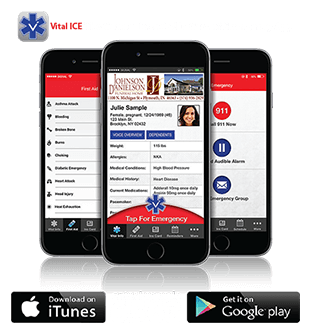FAQS
Frequent Questions
Learn more about Johnson-Danielson Funeral Home with our Frequently Asked Questions section.
-
What services do funeral directors perform?
The funeral director's job is to assist the bereaved in various ways to help them through the loss of a loved one. A funeral director provides bereavement and consolation services for the living, in addition to making arrangements for the cremation, burial, and memorial services for the deceased. He fulfills the role of funeral arranger, funeral director, funeral attendant, and embalmer.
The following list is not all-inclusive, but describes some of the major tasks of a funeral director:
- Removal and transfer of the deceased from the place of death to the funeral home
- Professional care of the deceased, including embalming, casketing, and cosmetology
- Consulting with family to make arrangements for the funeral service
- Filing certificates, permits, and other required forms
- Obtaining copies of the death certificate
- Arrangements with the cemetery, crematory, or other places of final disposition
- Creates and publishes the obituary
- Arrangements for clergy, music, flowers, transportation, pallbearers, and special fraternal or military services
- Directs and manages the funeral service and the funeral procession
- Assists the family with death-related claims, including Social Security, VA insurance, grief counseling
-
Why are funerals so expensive?
A traditional funeral involves a number of services which add to the total cost. Besides a non-declinable basic services fee, other charges may include removal/transfer of the body to the funeral home; embalming; other preparation of the body; use of facilities and staff for viewing; use of facilities and staff for the funeral ceremony; use of a hearse, service car, or van; a basic memorial printed package; metal casket, a vault or grave liner, and purchase of a cemetery plot.
-
What is the purpose of a funeral?
A funeral or memorial service provides an opportunity for the living to show respect for the deceased and pay tribute to their life. It provides a framework to freely and openly express our beliefs, feelings, and thoughts about the death of our loved one. It gives us permission to grieve our loss, share in solidarity, and gain strength from others who are experiencing the same loss.
-
What are the choices for funeral services?
The four main types of funeral services include the traditional funeral service, the memorial service, the committal service, and the affirmation or celebration of life service.
-
Can you still have a funeral if you choose cremation?
Yes, cremation or burial is merely the disposition of the body. Funeral services are to honor and remember your loved one, regardless of disposition.
-
Can I plan in advance if I choose cremation?
Pre-arranging funeral services can be done regardless of the final disposition. Pre-arranging is simply recording your wishes with the funeral home and prefunding if you choose to do so.
-
What information should I bring to the arrangement conference?
- Advance Directives - If the deceased left any written advance directives concerning the disposition of his remains and memorialization, you need to bring them with you. These instructions may be found in a will, or there may be a formally witnessed disposition directive, funeral pre-arrangements, or a pre-need contract.
- Military Discharge Papers
- Details on any cemetery property owned by the deceased or the family (grave plot, columbarium space, etc.)
- Recent photograph of the deceased and any personal effects that you wish to be included in the viewing or burial
- Specific information on the deceased:
- Full legal name
- Address
- Marital status
- Social Security number
- Date of birth
- Place of birth (city and state)
- Educational history (number of years of schooling)
- Armed Forces service dates and serial number
- Occupation or profession
- Parent's names, including mother's maiden name
- Next of kin and other survivors
-
What are some questions I should ask when considering cremation providers?
1. Does the price you are quoting include everything, or are there add on fees that I need to be aware of?
2. Where is my loved one going to be taken and held prior to the cremation? At Johnson-Danielson Funeral Home we offer a No-Hidden Fee Guarantee, the price we quote is the price, no surprises. Prior to the cremation, your loved one will held in our climate controlled holding area.
-
Where is the cremation being performed?
The cremation takes place at a licensed crematory in Indiana.
-
Where is body being held?
Your loved one will be sheltered in a climate controlled environment at our facility at 1100 N. Michigan Street, Plymouth, Indiana 46563, USA.
-
Can I witness the cremation?
Witnessing a cremation may occur if the Green Cremation or Honor and Remember Packages is selected. The cremation witnessing will take place at the Swan Point Cemetery’s viewing room.
-
Do we own our own crematory?
No. The cremation takes place at a licensed crematory in Indiana. This ensures that a third party checks the identification, cremation authorizations, and permits before the cremation is performed. For this reason, many states do not allow funeral homes to own a crematory or cemetery.
-
Is embalming necessary for cremation?
No, embalming is not required. However if you choose to have a public viewing or funeral service prior to the cremation… embalming may be required.
-
Do I have to come to your facility to finalize the paperwork?
No, we have found that many families prefer to make arrangements in the comfort of their own homes. The arrangements can be handled online, by email, fax, or mail.
-
Do all funeral homes and cemeteries have a crematory?
No. While almost every funeral home offers cremation, only a small percentage of cremation service providers have their own cremation units.
-
What can I do with cremated remains?
Ask your Funeral Director about suitable options and traditions of different faiths, cultures and nationalities.
-
Can we view a body prior to cremation?
A deceased may be identified at the funeral home facility before the cremation is performed.
-
How does the entire process work?
To arrange for a cremation, the authorization must be signed by the next-of-kin. Our staff will prepare the death certificate to be signed by the primary care physician. In all cremations, the State Medical Examiner must review the certificate and issue a cremation certificate to the funeral home before the cremation can take place. The certificate, once reviewed by the Examiner will be filed in the City or Town where the death occurred. Once the necessary forms and authorizations are complete, the cremation takes place.
-
How long does it take to complete the cremation and get the cremated remains back?
Our goal is to complete the cremation as quickly as possible; however, the process is dependent on several different agencies and the doctor who is responsible for signing the death certificate. For 90% of the families we serve the average turnaround is 3 to 5 business days.
-
Can I come in to your office to make these arrangements instead of completing them online?
Yes. You are always welcome at our arrangement office, please just make an appointment prior to your visit. We are also available to come to your home, or meet you at your convenience.
-
Can I place an obituary in the newspaper?
Yes. We will be happy to assist you with placing an obituary in the newspaper of your choice. In addition, we will place the obituary on our website, where friends and family can leave condolences online.
-
Is there anything else I will be required to buy?
No! We do offer other services; however, there are no hidden fees in our packages.
-
What is a memory table and/or a memory board?
At the funeral home, a memory table may be used to display personal items of the deceased. A memory board would have a collection of family photographs attached and can be displayed on an easel at the funeral home for visitors to reminisce about their life experiences with the deceased.
-
Must an obituary be published in a newspaper?
We publish the obituary notice on our website free of charge and there is no limit to the length of the online obituary. The publication of an obituary notice in a newspaper is a matter of your personal choice. While most newspapers control the editorial format, you have the right to limit the amount of information, if any, provided to them.
-
Is a funeral or memorial service always held in a funeral home or place of worship?
Describe the item or answer the question so that site visitors who are interested get more information. You can emphasize this text with bullets, italics or bold, and add links. -
Are there special cremation caskets?
There is a choice of very affordable cremation caskets that are completely combustible. The selection includes options from a plain cardboard container to a hardwood casket.
-
Can I take the cremated remains home?
Yes. The remains are normally placed in an urn. Most families select an urn that is suitable for placement on a mantle or shelf. Urns are available in a variety of shapes, sizes, and materials.
-
Is embalming necessary for cremation?
No. It is your choice. It may depend on if the family selected a service with a public viewing of the body with an open casket, if they want the deceased’s appearance enhanced for a private family viewing, if the body is going to be transported by air or rail, or because of the length of time prior to the cremation.
-
How does the process work?
To arrange for a cremation, the authorization must be signed by the next-of-kin. Our staff will prepare the death certificate to be signed by the primary care physician. In all cremations, the State Medical Examiner must review the certificate and issue a cremation certificate to the funeral home before the cremation can take place. The certificate, once reviewed by the Examiner will be filed in the City or Town where the death occurred. Once the necessary forms and authorizations are complete, the cremation takes place.
-
How can I help a child deal with the death of a loved one?
Children grieve just as adults do. Any child old enough to form a relationship will experience some form of grief when a relationship is severed. Adults may not view a child behavior as grief as it is often demonstrated in behavioral patterns which we misunderstand and do not appear to us to be grief such as “moody,” “cranky,” or “withdrawn.” When a death occurs, children need to be surrounded by feelings of warmth, acceptance, and understanding. This may be a tall order to expect of the adults who are experiencing their own grief and are upset. Caring adults can guide children through this time when the child is experiencing feelings for which they have no words and thus cannot identify. In a very real way, this time can be a growth experience for the child, teaching about love and relationships. The first task is to create an atmosphere in which the child’s thoughts, fears, and wishes are recognized. This means that they should be allowed to participate in any of the arrangements, ceremonies, and gatherings which are comfortable for them. First, explain what will be happening and why it is happening at a level the child can understand. A child may not be able to speak at a grandparent’s funeral but would benefit greatly from the opportunity to draw a picture to be placed in the casket or displayed at the service. Be aware that children will probably have short attention spans and may need to leave a service or gathering before the adults are ready. Many families provide a non-family attendant to care for the children in this event. The key is to allow the participation, not to force it. Forced participation can be harmful. Children instinctively have a good sense of how involved they wish to be. They should be listened to carefully.







